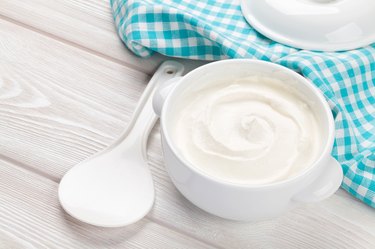
Lactobacillus acidophilus is a strain of bacteria that can digest lactose, the sugar in milk and other dairy products. If you're lactose intolerant and experience digestive complications upon consuming dairy, you may be wondering whether supplemental Lactobacillus can help alleviate your symptoms. In general, researchers are split on this issue. There are some sure ways that Lactobacillus bacteria can make your life easier, however.
Lactose
Video of the Day
Lactose is the chemical name for milk sugar. You can't absorb it directly from the gut, but under normal circumstances, you digest it into its constituent compounds and then absorb those. If you're lactose intolerant, however, you don't produce lactase, which is the enzyme responsible for lactose digestion. As such, if you consume lactose-containing foods, you experience uncomfortable digestive symptoms including cramping and gas, explain Drs. Reginald Garrett and Charles Grisham in their book "Biochemistry."
Video of the Day
Lactobacillus Acidophilus
Lactobacillus acidophilus is a lactose-digesting bacterial species that is non-pathogenic, meaning it doesn't pose any danger to humans. In fact, Lactobacillus commonly inhabits your lower gastrointestinal tract. In recent decades, scientists have explored the probiotic potential of Lactobacillus, meaning they've been investigating whether supplementing the diet with Lactobacillus bacteria does humans any good. It seems that there are some useful applications of Lactobacillus supplements -- they help maintain regularity of the digestive tract, for instance, and can help prevent yeast infections.
Treating Lactose Intolerance
Regarding whether Lactobacillus acidophilus supplements can help those with lactose intolerance, researchers are split. Some studies, including a 1995 article published in the "Journal of Dairy Science," suggest that Lactobacillus supplementation helps lactose intolerant individuals to digest the lactose in dairy. Others, such as a 1999 study published in the "American Journal of Clinical Nutrition," demonstrate no effect. Lactobacillus supplements won't hurt you, so you may wish to try them in order to determine whether you'll get any benefit.
Other Considerations
One sure way in which Lactobacillus bacteria can help make your life more comfortable -- and your diet more complete -- if you're lactose intolerant is through their action on fermented dairy products such as yogurt. To make yogurt, manufacturers cultivate Lactobacillus and other similar bacterial strains in the milk. The bacteria break down lactose, producing acid in the process. This gives yogurt its creamy texture and sour flavor. It also removes most of the lactose from the milk, meaning that you can probably eat yogurt even if you're lactose intolerant.
Is this an emergency? If you are experiencing serious medical symptoms, please see the National Library of Medicine’s list of signs you need emergency medical attention or call 911.